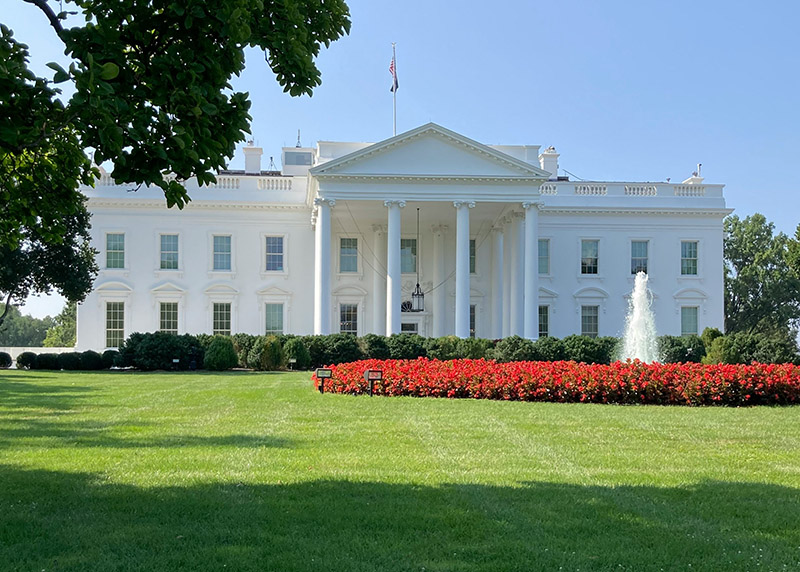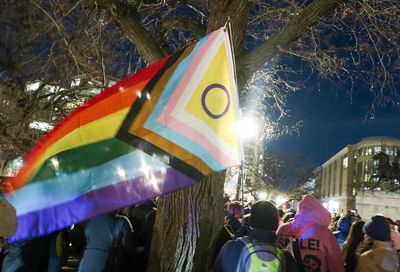Federal court blocks Arkansas law denying gender-affirming care to transgender youth
State officials will be prevented from enforcing the law, which calls for disciplinary measures against trans-affirming doctors.

A federal court has blocked Arkansas state officials from enforcing a law that would have prohibited health care professionals from providing gender-affirming treatments to transgender youth, or even referring them to other practitioners providing those treatments.
The law, set to go into effect on July 28, was passed by Republican lawmakers over the objection of Gov. Asa Hutchinson (R), who vetoed the bill over concerns that it was too broad and infringed on parental rights.
In addition to banning transgender youth from accessing gender-affirming treatments, such as puberty blockers or hormones, the bill also bars Medicaid and private insurers from covering treatments for minors, and allows health insurers to refuse to provide coverage for any transition-related care, regardless of the patient’s age.
Enlisting the help of the American Civil Liberties Union, four transgender youth, their respective families, and two physicians who specialize in treating gender dysphoria sued to block the law while their lawsuit goes to trial on its merits, in the hope that the law will ultimately be declared discriminatory and overturned.
On Wednesday, the Eastern District of Arkansas heard oral arguments in the case, and granted the plaintiffs’ request for a preliminary injunction that will temporarily prevent state officials from attempting to enforce the ban — which calls for disciplinary action and sanctions against medical providers who attempt to treat transgender minors’ gender dysphoria — until the court issues a final decision on the law’s constitutionality.
The plaintiffs have argued that the law violates the children’s right to equal protection under law, infringes on parental rights, and violates the free speech rights of both transgender minors — who wish to identify themselves according to their gender identity — and physicians, who are prohibited by the law from offering the medical treatments they believe are best for treating their transgender patients.
If the law is allowed to go into effect, the plaintiffs argue the results will be devastating for transgender minors. One of the plaintiffs, 15-year-old Dylan Brandt, who is currently receiving gender-affirming medical care, faces the loss of treatments that have delayed the onset of puberty and allowed his body to match his gender identity. He worries that his feelings of gender dysphoria will simply be exacerbated when he’s forced to develop female characteristics due to an inability to access gender-affirming treatments.
Amanda and Shayne Dennis, the parents of 9-year-old Brooke, say they worry that the law will reverse the progress they’ve seen with their daughter, who has become happier and more well-adjusted since socially transitioning. Although Brooke is not receiving medical treatments for gender dysphoria, her parents fear they may see a regression as Brooke begins going through puberty and is unable to access the care needed to treat her gender dysphoria. The Dennis family says they may have to move away from Arkansas and uproot their entire family — including Brooke’s grandparents — if the law remains in place.

Similar laws have been introduced in several dozen other states, although Tennessee is the only other state to pass such a ban. However, Texas Gov. Greg Abbott has indicated he will push for a ban on transgender health care being provided to minors, thought it remains to be seen whether that will be via executive order or whether it will be added to a list of bills being considered in a special session of the legislature.
“This ruling sends a clear message to states across the country that gender-affirming care is life-saving care, and we won’t let politicians in Arkansas — or anywhere else — take it away,” Holly Dickson, the executive director of the ACLU of Arkansas, said in a statement. “Today’s victory is a testament to the trans youth of Arkansas and their allies, who never gave up the fight to protect access to gender-affirming care and who will continue to defend the right of all trans people to be their authentic selves, free from discrimination. We won’t rest until this cruel and unconstitutional law is struck down for good.”
Arkansas Attorney General Leslie Rutledge, a supporter of the law, said in a statement she intends to appeal the court’s ruling, arguing that transgender children who receive gender-affirming care will one day regret their transition and claiming that the treatments result in long-term harm.
“This evidence-based law was created because we cannot allow children as young as nine years old to receive experimental procedures that have irreversible, physical consequences,” Rutledge said. “I will aggressively defend Arkansas’ law which strongly limits permanent, life-altering sex changes to adolescents. I will not sit idly by while radical groups such as the ACLU use our children as pawns for their own social agenda. As the Attorney General of Arkansas, I will be appealing today’s decision.”
See also: Tennessee governor bans transgender youth from accessing gender-affirming medical care
The court’s decision marks the second time this year that a federal court has blocked an anti-transgender law passed only a few months earlier. A federal judge in Tennessee recently blocked a law requiring businesses and other establishments to post a “warning” sign if they allow transgender individuals to use multi-stall public restrooms that match their gender identity. That law is currently being challenged by two business owners who claim the law violates their First Amendment rights to free speech and freedom of association, due to the fact that both owners have intentionally offered their businesses up as community gathering spaces that are affirming of transgender customers.
“We warned lawmakers that if they passed laws attacking trans people that they would see us in court,” Chase Strangio, the deputy director for transgender justice with the ACLU’s LGBTQ & HIV Project, said in a statement. “This victory belongs to Dylan, Brooke, Sabrina, and Paxton, as well as other trans youth in Arkansas who spoke up about the harms created by this law. Our work in Arkansas and around the country is far from over — including with this law.”
According to a 2021 survey by The Trevor Project, the nation’s top suicide prevention and crisis intervention organization, more than half of transgender and nonbinary youth considered suicide in the past year, with 1 in 5 eventually attempting suicide. Research has also demonstrated that gender-affirming social, medical, and legal interventions for transgender and nonbinary youth have positive effects on mental health and overall well-being, while decreasing depressive symptoms and feelings of suicidal ideation.
“This is a huge victory for transgender and nonbinary in Arkansas,” Sam Brinton, the vice president of advocacy and government affairs for The Trevor Project, said in a statement. “…Gender affirming medical care is associated with positive mental health outcomes and reduced suicide risk. All trans youth deserve access to this best-practice care regardless of where they live.”
Editor’s note: This story was updated to include comment from Arkansas Attorney General Leslie Rutledge.
See also:
Transgender man and woman sue over Montana law blocking them from changing their birth certificates
Caitlyn Jenner ditches campaign to go to Australia, says she’d vote for Trump in 2024
Gay man found bleeding and barely breathing on train tracks in Atlanta
Support Metro Weekly’s Journalism
These are challenging times for news organizations. And yet it’s crucial we stay active and provide vital resources and information to both our local readers and the world. So won’t you please take a moment and consider supporting Metro Weekly with a membership? For as little as $5 a month, you can help ensure Metro Weekly magazine and MetroWeekly.com remain free, viable resources as we provide the best, most diverse, culturally-resonant LGBTQ coverage in both the D.C. region and around the world. Memberships come with exclusive perks and discounts, your own personal digital delivery of each week’s magazine (and an archive), access to our Member's Lounge when it launches this fall, and exclusive members-only items like Metro Weekly Membership Mugs and Tote Bags! Check out all our membership levels here and please join us today!


























You must be logged in to post a comment.